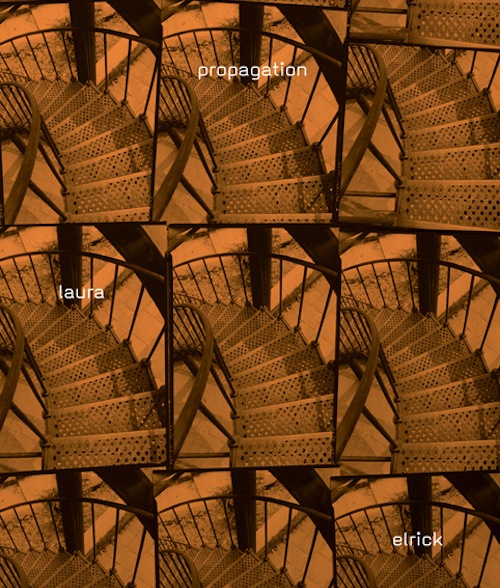Clint Burnham on Laura Elrick's Noninvasive Propagation

How did we only now see this? A good one: Vancouver poet, novelist, and scholar Clint Burnham (we've been digging his book on the Kootenay School, The Only Poetry That Matters) has reviewed Laura Elrick's Propagation (Kenning Editions 2013) for Lemon Hound. "It seems to me that the messing that Laura Elrick does with words . . . is both a lot of messing with – an intense kinda repetition and looping that’s half like out-takes from Warhol’s a and half what you’d hear on any urban bus. . . ." Elrick clarifies her techniques in relation to Stein's in an email to Burnham: "Stein’s repetition was 'agentic, all about insistence and the love of (and faith in) the machine. Whereas mine is about being invaded, thus parasitical. Thus 'donning the mask of the enemy and sliding it away from its source . . . .'" More:
Now, basic Poetry-being-done-now-101 says two things about such a passage. First, that we don’t know where sense (the “phrasal propulsion” that McCaffery talks about w/r/t Karen Mac Cormack’s work) begins or ends over line breaks. So we don’t know if “said” in Elrick’s third line is a verb that takes as its subject the phrase “people who knew him.” That is, because of the semblance of dialogue or conversation here, we don’t know if this is mimicking the effect of “someone” saying “people who knew him, people who knew him said …” or if there is more of a freedom of the text here (but which is also invasive/parasitical? parasitical I get – the text is parasitical on the repetition of the everyday, but invasive, not so much, unless it’s the other way around, the text is thus host to an invasion of the everyday).
The second thing is that uncertainly makes poetry of this ilk Political. Because the poem is not telling you how to make meaning, this reader is liberated from merely consuming meaning. The productive reader: hence the rejection of a prefab meaning, the rejection that meaning lies either with the author (humanism) or the text (formalism). The death of both of these (Barthes, Place).
But for all that influential body of theory, it is no longer adequate to account for what Elrick is doing here. Rather, we have to not even care about meaning qua interpretation. And I don’t mean (sorry) we should turn to affect, or praxis, or whatever is after afterness or older than old. What goes on a whole lot in Elrick’s book is the propagation – the spreading (of the word, of seeds, of words) – of how language is being used/is using “us” (in the limited sense of us speakers/writers/readers of English). So “people who knew him/people who knew him” is a kind of repetition that goes on orally (this is and is not a realism, but it also is and is not a narcissism) in the propagation of language. But also perhaps of meaning, but meaning spread so thin, we keep repeating ourselves. You know what I’m saying? See what I’m getting at? That old Get Smart joke: “Can you repeat that, Chief?” “What part didn’t you understand, Max?” “Everything after you said ‘Now listen carefully’.”
Or the guy on the radio this morning: “And you know as crazy as that – as crazy as that – as crazy as that sounds… .” Or when a student in my creative writing class, asked to record & transcribe a conversation, recorded me talking to the class, and I’m so articulate: “Yeah, yeah, yeah, yeah, yeah, I-I did have it down that we’d start with the- the work but why don’t we actually start with umm.”
OK so my point is and is not that Elrick is just copying reality. Rather, what her work is pointing to is not so much in spoken discourse (whether through mimesis or simulation) but, what is not in spoken discourse, what we do not hear until Elrick put it into her book. And so we have the repetition – in the book – of repetition:
Whatever else they do and doing that whatever else they do they’re (p. 38) finding one’s joy finding joy watching it scoot over the ink watching it one’s joy (p. 62) resonance because what you can say of the detail is resonance because the detail (p. 67)
A great review. Read it all here.


